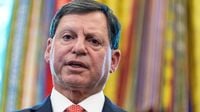On October 6, 2025, the Treasury Department made a move that has sent ripples through Washington and beyond: Frank Bisignano, the current Social Security Administration (SSA) Commissioner, will also serve as the first-ever chief executive officer (CEO) of the Internal Revenue Service (IRS). The announcement, delivered by Treasury Secretary Scott Bessent—who is also moonlighting as the acting IRS commissioner—marks a dramatic consolidation of leadership at two of the federal government’s most public-facing agencies.
“Frank is a businessman with an exceptional track record of driving growth and efficiency in the private and now public sector,” Bessent declared in a press release, emphasizing that Bisignano’s leadership at the SSA had already yielded “important and substantial progress.” According to Bessent, the shared technological and customer service ambitions of the IRS and SSA made Bisignano “a natural choice for the position.”
Bisignano’s resume is, by any measure, formidable. Before joining the Trump administration, he served as CEO and chairman of Fiserv, a major player in payments and financial technology, and earlier held roles as co-chief operating officer of JPMorgan Chase and CEO of its mortgage banking division. During his Senate confirmation hearings for the SSA post earlier this year, Bisignano touted this private sector experience, arguing it equipped him to tackle the federal bureaucracy’s thorniest technological challenges.
Yet, beneath the surface of this historic appointment, controversy is brewing. For one, Bisignano will remain at the helm of the SSA even as he takes over the day-to-day management of the IRS. He will report directly to Bessent, who retains the title of acting IRS commissioner. The IRS CEO role itself is a novel creation—one that, crucially, does not require Senate confirmation. This arrangement has not escaped the notice of watchdogs and advocates.
“Apparently this CEO job is responsible for the ‘day-to-day’ operations of IRS, but those are the statutory duties of the IRS commissioner,” Kathleen Romig, director of Social Security policy at the Center on Budget and Policy Priorities, told reporters. She described the move as a way to “bypass the Senate,” a sentiment echoed by others. Nancy Altman, president of Social Security Works, a progressive advocacy group, went further, calling Bisignano’s divided attention “an insult to beneficiaries.” She warned, “Now, Bisignano’s divided attention will create a bottleneck that makes the inevitable problems that arise even harder to correct.”
The backdrop to this leadership shuffle is a period of turbulence for both agencies. The IRS, in particular, has cycled through six commissioners during the Trump administration’s second term. Billy Long, an auctioneer and former congressman, lasted just two months before being ousted. His predecessor, Melanie Krause, resigned after a controversial data-sharing deal with immigration authorities. All told, the IRS has lost 17% to 19% of its workforce in key filing season functions, including an 18% drop in fraud detection staff and a 25% reduction in IT services personnel, according to the agency’s inspector general.
These staffing cuts, part of a broader push by the Department of Government Efficiency, have also hit the SSA hard. At least a quarter of the IRS’s IT staff has been cut, and an August watchdog report found that nearly half of the probationary staffers swept up in reduction-in-force orders had “fully successful” or better reviews. Social Security advocates argue that the loss of experienced workers has created a leadership vacuum and threatens to undermine service for seniors, people with disabilities, and their families.
Despite these headwinds, Bisignano has trumpeted improvements at the SSA. In a letter to Sen. Elizabeth Warren, D-Mass., he highlighted a dramatic reduction in wait times for the agency’s national 800 number—from 27.6 minutes in October 2024 to just 4.6 minutes by late July 2025. Field office wait times also fell, from between 28.3 and 30.9 minutes in fiscal year 2024 to 20.9 minutes from April through June 2025. The backlog of initial disability claims, Bisignano reported, had shrunk by about 26% from its all-time high in June 2024. The SSA’s online customer service portal is now accessible 24/7, and scheduling and phone services have seen marked upgrades.
Still, some experts have questioned the accuracy of these metrics, noting that Bisignano’s methodology changed to count interactions with AI agents or callbacks as resolved calls, rather than actual conversations with human representatives. Critics argue that this paints an overly rosy picture of the SSA’s progress and may not reflect the real experience of beneficiaries.
The timing of Bisignano’s dual appointment is especially fraught, as the IRS prepares for a tax season shaped by the new One Big Beautiful Bill Act. The law introduces new deductions for overtime and tips, but the agency’s ability to implement these changes is “at risk,” according to a recent inspector general’s report. With key personnel gone and morale shaken, the IRS faces a daunting challenge in rolling out the new rules smoothly.
There are also broader concerns about privacy and data security. With the same person now overseeing both the IRS and SSA, the Trump administration’s efforts to consolidate government databases have come under renewed scrutiny. Romig warned that combining leadership could “facilitate the consolidation of Social Security and IRS databases for use in immigration enforcement.” She pointed to previous hurdles—requiring sign-off from separate commissioners—that no longer exist. “It raises a lot of really important questions,” she said, especially given recent reporting that the Department of Government Efficiency has sought to use these databases to track undocumented immigrants.
For his part, Bisignano has denied any intention to privatize Social Security, telling lawmakers, “I’ve never thought about privatizing. It’s not a word that anybody has ever talked to me about, and I don’t see this institution as anything other than a government agency that gets run for the benefit of the American public.” Nonetheless, the skepticism persists, especially from Democratic lawmakers who raised these concerns during his confirmation earlier this year.
Supporters of the appointment, including Bessent, insist that Bisignano’s business acumen and dual-track record in public and private sectors will help modernize both agencies. “Under his leadership at the SSA, he has already made important and substantial progress, and we are pleased that he will bring this expertise to the IRS as we sharpen our focus on collections, privacy, and customer service in order to deliver better outcomes for hardworking Americans,” Bessent said.
Whether this unprecedented consolidation of power will deliver the promised efficiency—or sow further chaos—remains to be seen. What’s certain is that with tax season looming and two of America’s largest agencies in flux, all eyes are on Frank Bisignano as he steps into this historic double role.






